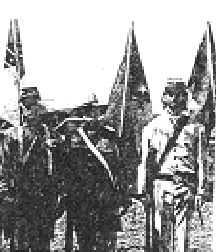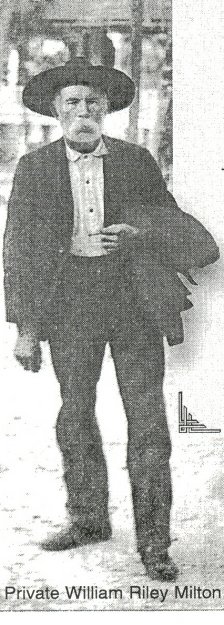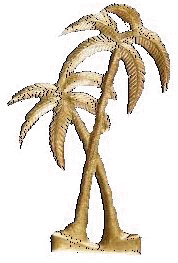
Sons of Confederate Veterans
Established October 25, 1994
Chartered March 7, 1995
Our Camp History

On October 25, 1994, the following descendents of Confederate Soldiers met at Tavares, Florida to start a new SCV Camp for Lake County, Florida. They were: Rick P. Moore, Bennie J. Davis, Tommie R. Powers, William A. Milton, Jr., and William S. McClelland. Officers elected were: Rick Moore, Commander, William S. McClelland, Adjutant, Bennie J. Davis, First Lt. Commander, Tommie R. Powers, Second Lt. Commander, William A. Milton, Jr., Chaplain. At the next meeting, Reverend Doctor George Pierce, Jr. was elected Chaplain and W. A. Milton, Jr. was elected Judge Advocate.
2nd Lt. Cmdr Powers and Judge Advocate Milton were delegated to find a Confederate Veteran who went from what later became Lake County, Florida to fight for Southern Independence. Since Lake County was a sparsely settled area at the time and part of Sumter County, the great grandfather of W. A. Milton, Jr., (Pvt. William Riley Milton) was chosen. It was also decided to use the Camp Number of the United Confederate Veteran's Camp that was here after the war, Number 741.
A charter was obtained from the SCV Headquarters and presented by 1st Lt. Commander Ron Hamilton, Florida Division, SCV. The Charter was presented on March 7, 1995 and all officers were sworn in.
During the month of April, 1995, the Camp participated in events by setting up an informational tent in order to inform the public of the new camp and to recruit new members.
Private William Riley Milton
Our Camp Namesake
and
Great Grandfather of Charter Member, Judge William A. Milton, Jr.

William Riley Milton, was born on December 5, 1845, in Apling, Georgia.
His sister, Ann, married John Turner on Christmas Day, 1845, and moved to the Umatilla, Fla. area.
The family history states that William Riley moved to Florida in 1855. While we are not certain whether William Riley was residing in the Umatilla area or the Madison area during the War Between the States, we do know from the Confederate Archives that he was enlisted by Lieutenant Hart at Madison, Florida, as a Private in Company B, Fifth Regiment, Florida Infantry, on May 3, 1864: his enlistment was for a period of three years. His military records indicate that he was injured during military service and spent time in the hospital.
He was captured at Farmville, Virginia, on April 6, 1865, and was paroled at Newport News, Virginia, on June 25, 1865, after taking an oath of allegiance to the United States. The Confederate records indicate that at the time he was paroled, his place of residence was listed as Sumter County, Florida.
With regard to his injury, he stated that it was as a result of "being thrown from my horse the year of surrender." Later medical examinations revealed that he suffered from a hernia and from a fracture of the right thigh bone which was poorly set. He did qualify for a veteran's pension from the State of Florida which was granted in 1902.
It appears that William Riley Milton was a part of Finagans' Brigade and the famous "Whirlwind Brigade." This Brigade was involved in most of the major battles throughout Virginia during the last years of the war.
After the war, William Riley Milton returned to what is now Lake County, Florida, and was married in Leesburg, Sumter County, Florida, on January 3, 1869, to Mary Miller. He made Homestead Entry no. 2394 on November 13, 1875, and on February 13, 1884, received a grant of 169 acres in Orange County, Florida.
William Riley and Mary Milton had six children: all born in Umatilla, Florida. Their son, William Andrew, was the father of W. A. Milton, Sr., and grandfather of W. A. Milton, Jr.; both born in Grand Island, Lake County, Florida.
William Riley and Mary Milton were charter members of the Live Oak Baptist Church, which was located near what is now Dona Vista, Florida.
William Riley Milton was typical of the other young men his age at the time. He entered the Army during the closing days of the war when the outlook was bleak for the South. He was fighting because his State was being invaded. He and the other men like him paid a terrible price and set examples of courage and self-sacrifice which we should continue to hold dear in their memory. William Riley Milton suffered the rest of his life from the injury sustained during the war: that did not prevent him from being a contributing member in his community and setting a good example for those around him. He died in 1907 and is buried in the Evergreen Cemetery in Daytona Beach, Florida.
"Whirlwind Brigade"
The following was obtained from an article titled "They Charged the Enemy Like a Whirlwind" by J. Mark Akerman, published in the Confederate Veteran (November - December 1992 Issue).
After several battles and other engagements, the original Perry's Brigade (the Florida 2nd, 5th and 8th) were down to approximately 250 men. A new brigade was formed out of the remnants of six Florida regiments: the 2nd, 5th, 8th, 9th, 10th and the 11th. The average effective strength of each regiment was, at this time, about 200 men.
Due to their noted performance at various battles such as Cold Harbor in June 1864, the noted correspondent (P. W. Alexander) with a Savannah newspaper explained the will and eagerness of the Florida Brigade to respond to its orders and said "They charged the enemy like a whirlwind". Thus giving the Florida unit the nickname of the "Whirlwind Brigade".
The Whirlwind Brigade gave distinguished service with bravery, several charges and endured exhaustive marches at places such as Weldon Rail Road, Belfield, Va., and Hatcher's Run.
By April 2, 1865, General Lee's lines begun to break and there were no reserves to fill the gaps. A few days later, Federal Gen. Custer captured what was left of the 5th, 8th and 11th Florida regiments. Many of the Floridians were without shoes and most had only a few rounds of ammunition.
The remaining members of the Florida Brigade marched to Farmville, a little village near Appomattox, where a sharp encounter ensued. However, the war was over for them. They finally had to yield to "overwhelming numbers and resources".
There is no question that Lee held a special charity for the members of his Florida Brigade.
There were few military units, from either side, that distinguished themselves more nobly or sacrificed more willingly during this Great War, than the Florida Brigade that came to be known fondly as the "Whirlwind Brigade".
